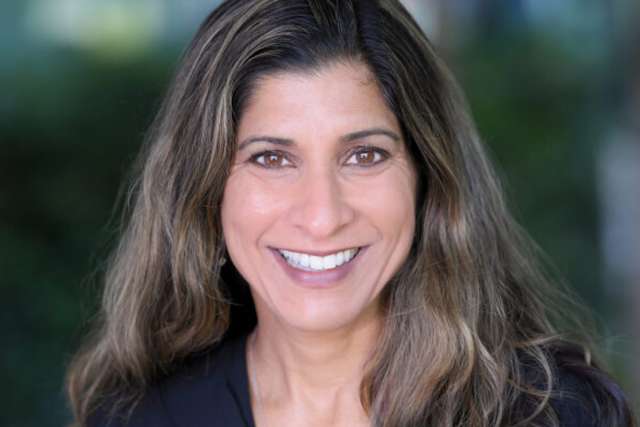As an undergraduate at Yale, Shafali S. Jeste, MD, studied philosophy, where she learned how the critical thinkers of our time asked transformative questions and tested new ideas. That training carried through Harvard Medical School and into child neurology, where her research has continued to ask questions and test ideas for early detection and biomarkers in autism and rare neurodevelopmental syndromes. Now, as chair of pediatrics at the David Geffen School of Medicine at UCLA and executive director of the Children’s Discovery and Innovation Institute, Dr. Jeste brings a clear vision: integrate research and clinical care, push innovation, center around community and invest in the next generation of physician scientists. We asked her about her approach as she takes on her new role at UCLA.
You began your academic journey studying philosophy at Yale before earning your MD at Harvard. What drew you to child neurology, and how did those early experiences shape the way you approach medicine and research today?
Dr. Jeste: I always knew I would be a physician, and a humanities education gave me the tools I use every day. Philosophy taught me to communicate clearly through both the spoken and written word and always to consider alternative hypotheses. I entered medicine curious about how the mind develops and why children follow different developmental paths. During training I explored general pediatrics, developmental-behavioral pediatrics, child psychiatry and child neurology. Child neurology fit because it requires us to understand the brain in depth, which is where many of my questions lived. A mentor also advised me to choose a field in which I loved the “bread and butter” of the specialty. In child neurology, the most common conditions we treat are epilepsy and developmental disabilities. Caring for these children is inherently long-term work, with rapid progress being made in treatments, and the opportunity to partner with families over time is what drew me in.
Your research has centered on early detection and biomarkers in autism and rare neurodevelopmental syndromes. How do you see this work transforming the future of care, and what excites you most about where the field is heading?
Dr. Jeste: We have shifted from assigning descriptive behavioral diagnoses to identifying measurable brain and behavioral changes that emerge in infancy. This has enabled earlier screening, closer surveillance, and interventions that start sooner. It also has opened the door to clinical trials of early intervention, including one I led for infants with tuberous sclerosis complex, a condition with a high likelihood of autism. At the same time, studies have clarified that autism is largely driven by genetic factors, allowing us to pinpoint specific genes that cause autism. This is opening the door to precision health, personalizing care based on what’s unique about each child’s condition. Most important, families now receive not only a diagnosis but also clearer guidance on expectations and evidence-based strategies. We don’t have answers for every form of autism yet, but we’re moving toward more answers than questions.
You have emphasized building programs that integrate research and care, such as CARING at UCLA and KiNDD at CHLA. What is your vision for advancing that model here for pediatrics here at UCLA Health?
Dr. Jeste: Pediatric care is team based by nature. Families and clinicians are the core team, and most children also need coordinated expertise across subspecialties. Researchers should be part of that same team, asking and answering questions that arise in clinic. Programs like CARING and KiNDD showed how to knit those pieces together, starting with neurogenetic conditions. The model is scalable across pediatrics. UCLA Health already does this well in areas like oncology, pulmonology and health services research. Looking ahead, an immediate opportunity lies in pediatric clinical trials. I want UCLA Health to be a world leader in pediatric clinical trials. We have a strong CTRC and CTSI, and outstanding clinical trials already underway. Pediatric clinical trials are challenging, especially in rare diseases with small samples and complex protocols, yet UCLA Health should be at the forefront. This is an early priority area, and we will build responsibly.
Issues of diversity, equity, and inclusion are central to pediatrics and to your advocacy for patient-centered research. How will you strengthen UCLA Health’s efforts for patients and within the physician-scientist pipeline?
Dr. Jeste: I view our mission as three interconnected pillars of research, clinical care and education, with community at the center of it all. Community means having a workforce and department that reflect Los Angeles and the patients we serve. When we spell out the words diversity, equity and inclusion, rather than defaulting to an acronym, the meaning is clear and essential. Representation and belonging must be embedded in the way we train, how we care for patients and how we design and interpret research. That’s how we build a stronger internal community and how we can become the most effective partners for our external communities.
Mentorship has been a recurring theme in your career, from launching a neurodevelopmental disabilities (NDD) fellowship to guiding young physician scientists. Why is it important to expand mentorship and training now?
Dr. Jeste: I chose to return to UCLA Health in this leadership role to help strengthen and cultivate the next generation. Early-career pediatricians and physician-scientists face real headwinds. Potential cuts to clinical care reimbursements and research funding would hit trainees and junior faculty hardest. That’s why I prioritize both mentorship and sponsorship. Mentorship develops skills and judgment; sponsorship creates visibility and opens doors to leadership opportunities. The moment is challenging, but it’s also one of the most exciting times in pediatrics. Precision health is advancing, AI is helping us analyze complex data, and treatments exist today that didn’t a decade ago. We have an obligation to help emerging leaders thrive so they can carry this work forward.
You hold national and international leadership roles and have received career-defining recognition. Which experiences or mentors have most influenced you, and what continues to inspire your work?
Dr. Jeste: Great mentors model not just expertise but also the values and way of life you aspire to. I’ve been fortunate to learn from many colleagues at UCLA Health, including Dan Geschwind, MD, PhD, whose creativity and innovation in autism genetics are contagious and have inspired my own efforts in clinical trial readiness in autism. My mentors have kept me aligned with my mission and have reminded me to stay curious and persistent. I also consider families and patients among my most important teachers. Parents fight every day for their children. My job is to be their advocate, to listen and to pursue the science and system-building that help them.
In her closing thoughts, Dr. Jeste emphasizes that child health is at a pivotal moment. “This is our moment at UCLA Health to lead with science, to stand up for children and families, and to build the teams, training and infrastructure that translate discovery into better lives.”




